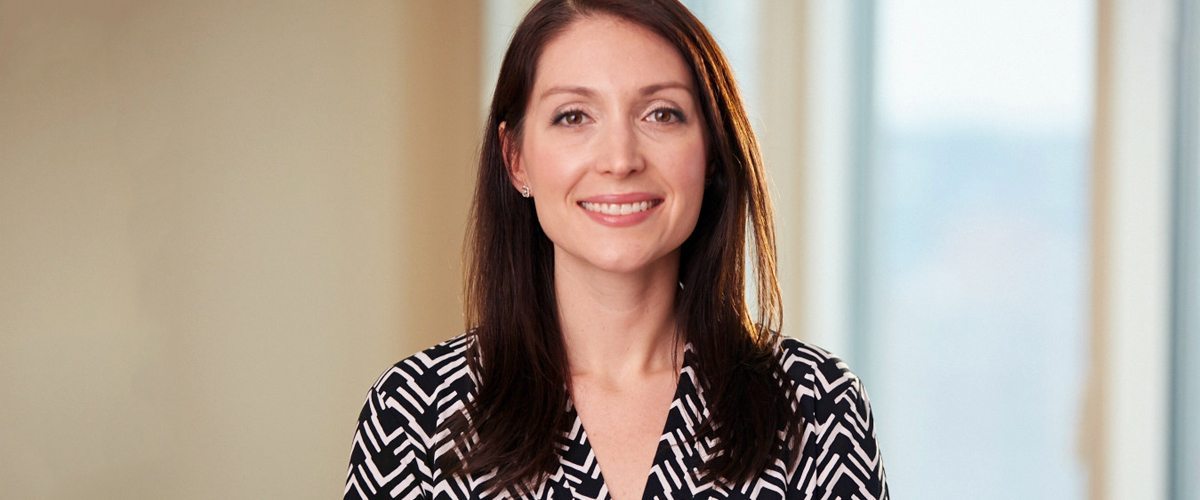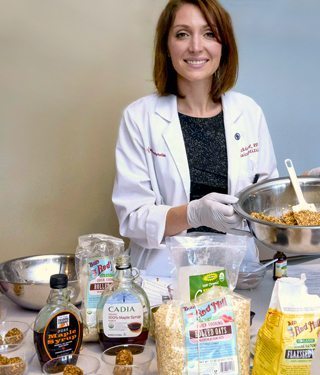A Cooking Program for Those Undergoing Chemotherapy
Patients and caregivers learn how to cook fast, nutritious, and tasty meals through A Taste of Well-Being.


The late Louisiana chef Paul Prudhomme once said, “You don’t need a silver fork to eat good food.”
If you’re being treated for cancer, though, side effects like soreness or ulcers in the mouth, and nausea and vomiting, can take the pleasure out of eating or eliminate your appetite altogether.
Patients undergoing chemotherapy or radiation therapy also may experience a bitter or metallic taste in their mouth that alters the taste of their favorite foods.
What’s more, if a cancer patient isn’t eating because he or she doesn’t have the energy to cook or lacks an appetite, weight loss may occur and have a negative effect on recovery. Research shows that eating a well-balanced diet can help the body fight infection, build new tissue, and better withstand treatments.
In her former role as senior clinical dietitian at NewYork-Presbyterian/Weill Cornell Medical Center, Jackie Topol saw the struggles that cancer patients face. While in the hospital, they received healthy, balanced meals. But when they returned home, often too fatigued to cook, they fell into poor eating habits, sometimes ordering takeout foods with low nutritional value, or losing weight because they didn’t feel like eating or they didn’t enjoy the taste of their meals.
These struggles led Topol to create recipes that are easy to make and designed to help patients maintain weight or gain back lost pounds.
Now an integrative dietitian at Integrative Health and Wellbeing at NewYork-Presbyterian and Weill Cornell Medicine, Topol’s recipes are included in A Taste of Well-Being, formerly known as The Nourishing Kitchen, an interactive program launched in the spring of 2014 and presented twice a month by registered dietitians at NewYork-Presbyterian/Weill Cornell Medical Center.

Jackie Topol
Each interactive session, which includes 12 people in a typical class, is designed to teach participants how to prepare delicious and nutritious meals and snacks. They can ask questions along the way and taste the finished recipes. To date, the program has helped well over 1,000 participants.
“The program provides them with really good insight, what to do, and easy recipes that they can put together quickly when they’re at home. I think that’s why the cooking demo concept works, because we’re not just telling patients, ‘Do this. Do that.’ We’re showing them, and that show-and-tell method is very valuable.”
For example, instead of reaching for a high-sodium frozen dinner or calling for a pizza because it’s quick and easy, attendees are armed with basic dietary know-how and food prep tips, and are able to get some of Topol’s palatable, nutrient-packed recipes on the table quickly. The recipes are designed to help manage a variety of side effects so patients can get excited about sitting down to eat again.
“This is the one thing they really have full control over,” Topol says. “They can decide exactly what foods they’re putting in their body and that will hopefully help them better manage side effects.”
In 2015, Topol expanded the program to help cardiac patients and hopes to introduce it to other patient populations, too. A lecture-style class for cardiac patients has done incredibly well — attendance doubled after adding the cooking demo component. Clinical dietitian at NewYork-Presbyterian/Weill Cornell Medical Center, Susanna Slukhinsky, who is also a trained chef, leads the cardiac cooking demos.
“We’ve talked about maybe going into pediatrics. I think it would also be great with our diabetic patients. I would love to take this to the outpatient arena,” Topol says, citing the success the cardiac demos have had. “The fact that patients can actually see some of the dietary recommendations we’re giving them and feel comfortable that they can then put those recommendations into practice when they get home is very powerful.”

